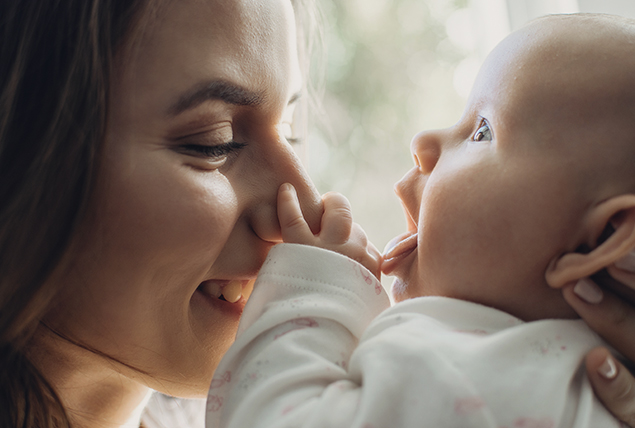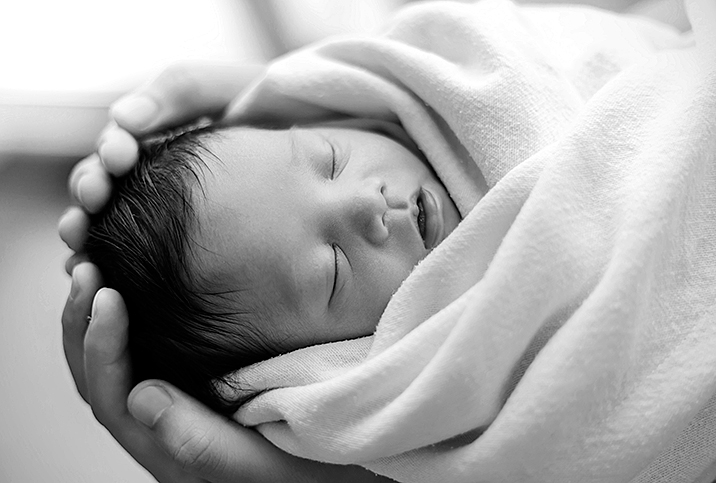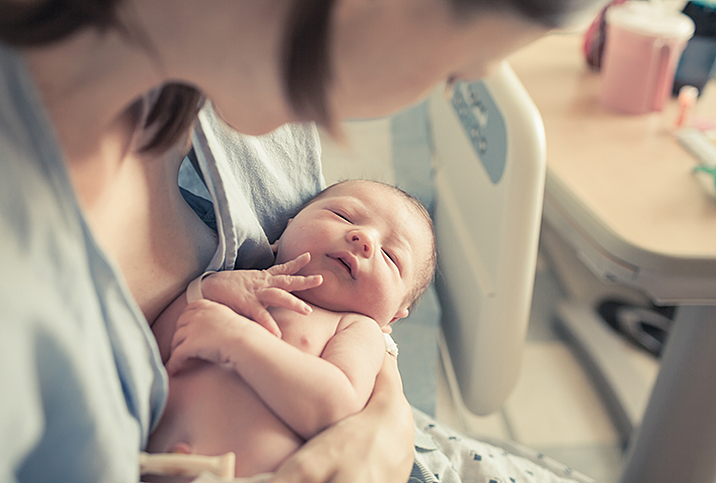Coming Down From Postpartum Euphoria

It might seem that postpartum anxiety and depression are the only mental health conditions that people sometimes experience after giving birth. But postpartum euphoria is another disorder triggered by birth—and it's often overlooked.
Learn about postpartum euphoria
You may have heard of the "baby blues." It's a nickname for a brief period when people who just gave birth may feel a little sad or mopey due to shifting hormones. There's also an opposite condition, sometimes termed the "baby pinks," or postpartum euphoria.
Also known as hypomania, postpartum euphoria is an intense feeling of happiness or mild mania. It can make you feel "high" in the days or weeks after birth. It's also relatively common. Postpartum euphoria is a mood disorder believed to affect 1 in 10 people who give birth.
"It is one of the lesser-known postpartum mood disorders," explained Courtney Glickman, Ph.D., licensed mental health counselor at the Collective Healing Center in Annapolis, Maryland.
She acknowledged that postpartum euphoria is perceived as challenging to research and measure. There are few studies on the subject, even though it is a known problem.
Postpartum euphoria symptoms
Boundless energy (even when you aren't getting much sleep) and happiness don't sound all that bad. But guess again. Postpartum euphoria has plenty of downsides and may warrant a visit to your healthcare professional.
"Often initially perceived as 'supermoms' who are energized and can function for long periods without rest, sufferers also exhibit impulsive and sometimes manic behavior, experience racing thoughts and struggle to concentrate," explained Faisal Tai, M.D., a board-certified psychiatrist and the CEO of PsychPlus in Houston.
Signs of postpartum euphoria to look out for include:
- Difficulty concentrating
- Speaking too fast
- Insomnia
- Feeling reckless
- Having "too much" energy
- Trying to do too many things at once
Postpartum euphoria can include a variety of symptoms. Generally, euphoria can last for up to eight weeks after birth, Glickman said. If it causes erratic or concerning behavior or goes on longer, then intervention may be necessary.
While there are things you can do to try to help relieve some of your symptoms, like insomnia, you may need to schedule an appointment with your healthcare provider if your symptoms interfere with your daily life.
Why is postpartum euphoria bad?
Some of the baby pinks symptoms don't seem so bad. Shouldn't everyone feel happy after giving birth?
"Although Western society tends to celebrate women who seem like nothing's happened to them following the birth of their babies, the truth is that this behavior is a cause for concern," shared Lesley Gilchrist, registered midwife and co-founder of My Expert Midwife, based in Harrogate, England.
Of the women referred to perinatal clinics for mood disorders, a 2021 research review stated that 12 percent to 30 percent of women exhibited symptoms of hypomania or mania after birth.
There is no definitive reason for postpartum euphoria, but pregnancy brings on obvious changes.
"It's a scientific fact that pregnancy causes physiological and hormonal changes that can cause suffering and behavior changes," Tai said. "The physical and emotional demands of caring for a baby can be very trying and potentially contribute to post-pregnancy mental health issues."
Links between depression and postpartum euphoria
"Postpartum euphoria is thought to be very underdiagnosed. The symptom profile is such that even healthcare professionals could miss the warning signs," Glickman said.
The downside of this oversight could leave women at risk of developing depression, which may go untreated.
A 2018 study published in the British Journal of Psychiatry found an association between euphoria and a "mild and common" form of bipolar disorder. The study revealed that women who still reported experiencing a high three days following birth were more likely than other women to feel mildly depressed at week six of the postpartum period.
Postpartum mental health difficulties can affect anyone, regardless of their mental health background. Around 1 in 7 women can develop postpartum depression. No mother is alone when experiencing the roller coaster of emotions in the days and months that follow giving birth.
How to recognize postpartum euphoria
The problem with postpartum euphoria is knowing there's even a problem. Gilchrist clarified that while not all women are affected in the same way, one characteristic that makes it problematic to recognize or treat is "a lack of insight that anything is amiss."
With so many changes occurring in a woman's body after birth and the added stress and upheaval of caring for an infant, it can be hard to recognize a bigger problem. It's essential to have the support of family, friends and health professionals who can be on the lookout for any warning signs of mental health problems after childbirth.
Gilchrist advised that prospective parents and their loved ones should keep informed on the signs of postpartum euphoria and the baby blues, postpartum depression, postnatal anxiety and postnatal psychosis. This way, they can better identify any issues if they happen.
Glickman said the key is to know the differences between what is normal happiness and what is hypomania during this time.
Speak to your doctor, who can develop a care plan for your symptoms. Your doctor will want to rule out other conditions and may order bloodwork and hormone tests. Beneficial treatments may include pharmacological treatment and cognitive behavioral therapy, or interpersonal therapy.
For people with an increased risk of developing postpartum euphoria, a doctor may recommend a pregnancy-safe, preventive medication before birth.
Ways to protect mental health after birth
Self-care is challenging, especially in the days and weeks after childbirth. Sometimes it can feel like one more thing to check off the list. But planning before giving birth can help new parents figure out what they might need when they feel overwhelmed later.
To protect your mental health during the postpartum period, Gilchrist recommended the following steps:
- Protect your space in the first few weeks after birth by asking for no visitors.
- Parents can ask family and friends to set up a "meal train" (a rotation of home-cooked meals left daily on your doorstep) after the birth.
- Ask for help handling laundry or cleaning the kitchen.
- Rest and recover during the early weeks as much as possible.
- Be open about how you are feeling with people you trust.
Consider how you want those first few weeks of recovery to look, but don't be afraid to modify your plan once your baby arrives. The important aspect is to maintain communication with your support network. Feel free to ask for help when you need it.
The bottom line
Postpartum hypomania can be more of a problem for people with preexisting mental health issues, such as bipolar disorder or previous postpartum psychosis. Mood swings are a typical part of the recovery process. Knowing the signs of postpartum euphoria and speaking with your doctor whenever you feel "off" can help you stay on top of your mental health.


















